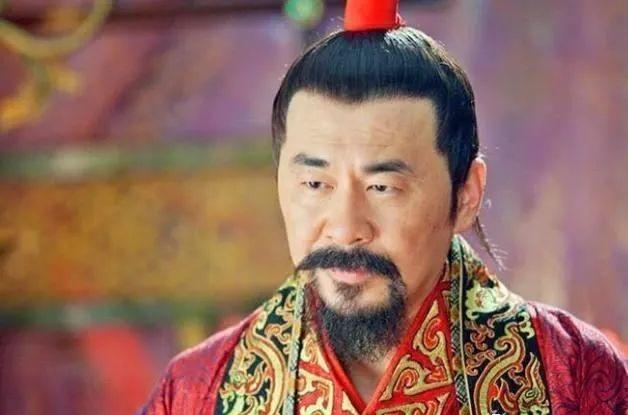
Zhao Kuangyin film and television image
In 972, Song Taizu said to zhao pu, the chancellor: "The five generations of Fang Zhen were cruel, and the people suffered from it, and more than a hundred Confucian officials were elected today, and the great domain was divided, even if they were greedy, they did not reach a single wuchen." This sentence can be said to have "made a deal with Zhao Pu", and the military ministers supporting the division of the army is the greatest threat to the Zhao and Song regimes; the civilian ministers have no soldiers, and "greedy even if they are greedy" will not endanger his imperial power. Because of this, after Song Taizu and Zhao Pu made friends, this led to the following small episode.
Zhao Pu served as the prime minister, and Song Taizu went out and suddenly came to the top of Zhao Pu's mansion. At that time, the two Zhejiang kings Qian Li had just sent emissaries to deliver letters and brought ten bottles of sea objects to the Han King's Mansion and placed ten bottles of sea objects in the left wing. Just when the emperor's car arrived, Zhao Pu rushed out to greet him, and there was no time to retreat.
When the emperor saw these things, he asked what they were, and Zhao Pu did not dare to hide them, and answered according to the actual situation. The Emperor said, "These sea creatures must be very good." "Immediately ordered to open the bottles, they were all filled with golden melon seeds. Zhao Pu was very frightened, and suddenly apologized and said, "I didn't have time to open it, I really don't know what is in the bottle, if I know this, I should go up to the emperor and withdraw them." Song Taizu listened but laughed and said, "Although accept them, don't worry too much." Those major national events are drawn up by you students. The implication is that you students and officials do some work, and it is not a problem to be greedy for more money, as long as you do not rebel.
Stills of the Legend of the Great Song Dynasty
Zhao Pu's houses in Kaifeng were built with these gold, and for a time, the Zhao and Song dynasties were filled with an extremely luxurious, corrupt climate. Because of Song Taizu's "indulgence" of civilian officials, it directly led to the Song Dynasty being the period when civilian officials were treated the best and corruption was the most serious, and it was also the most important reason for the eventual demise of the Song Dynasty.
According to historical records, although Song Taizu took into account other political goals, especially Zhao Punai, the more greedy he was, the more he showed that he was more "reliable" politically, in a sense, by allowing corruption to grasp the stains and handles of officials, it was also a kind of "art of control" under the imperial dictatorship, a sword that achieved control from top to bottom. That is to say, fundamentally, the emperor needed corrupt officials more than clean officials.
Song Taizu indulged in official corruption, haha a smile and easily let the senior officials at the level of the prime minister "take it" on gold and silver, which is bound to lead to a series of "butterfly effects", from the logical causal relationship, no matter the size of the official, their corrupt law is interdependent, mutual attack and defense, each other to shield each other, the emperor to the prime minister corruption and indulgence, small officials will inevitably imitate. The so-called "good at the top, the bottom will be worse", this kind of corruption in the "collapse mode" eventually buried the entire state power.
Yang Wanli, a minister of the Southern Song Dynasty, profoundly pointed out after witnessing the corruption of the officialdom: "It is difficult to control officials, and it is not difficult to prohibit dirty officials... The great officials are unjust and blame the small officials, the law is slightly above and detailed at the bottom, and the disobedience of the world is also fixed. Yang Wanli indirectly explained the results of Song Taizu's indulgence in the corruption of civilian officials, and as a political official who was forced to move south, Yang Wanli was very sad about the inability to curb the corruption of civilian officials, and he had a very profound understanding of this kind of corruption and indulgence factor of "chaotic self-improvement".
Under the ancient imperial autocracy, the power structure was pyramid-shaped, and at the top of it was the supreme emperor. On the one hand, the emperor is nominally the supreme ruler; on the other hand, in the actual operation of power, it is impossible for the emperor alone to achieve complete control over the country and political power. For this reason, the emperor had to resort to the cooperation of the bureaucracy to ensure the stability of his imperial power. In exchange for the support of the bureaucracy, in addition to the use of power, the emperor had to allow the bureaucracy to commit wrongdoing, including corruption. Thus, under the imperial dictatorship, corruption became a structural and endogenous product. Essentially, corruption in the bureaucracy is a form of buy-in loyalty. The key word in Song Taizu's treatment of the corruption of the prime minister is "laughing and taking it", and this seemingly extremely "clever" "art of taming the courtiers" precisely reflects the law of corruption of the ruling class in China for thousands of years, and the historian Wu Han once wrote: "In ancient China, thousands of years up and down, perusing history, the era of simple politics and punishment, honest officials, and the era of living and enjoying the people's happiness is simply the sound of Huang Zhong Da Lu, which is pitiful. ”